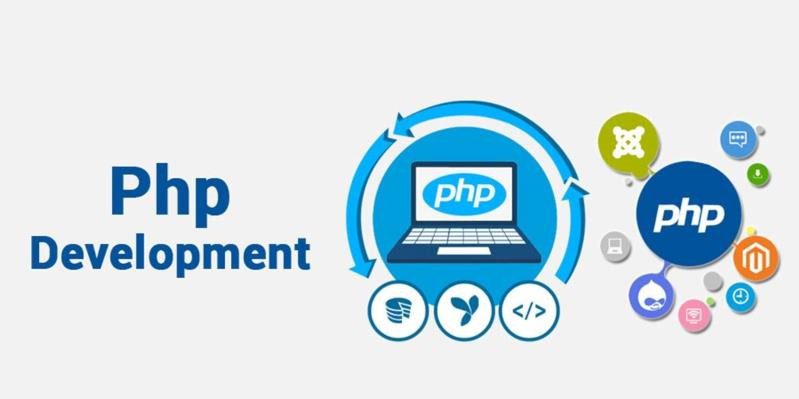In the vast landscape of web development, PHP has been a stalwart companion for nearly three decades. As of now, it powers a staggering 78.9% of all websites, from social media giants like Facebook to information hubs like Wikipedia. Despite the occasional whispers of its decline, the numbers and recent updates tell a different story.
Scope of PHP Developers

Scope of PHP developers
The PHP Landscape
PHP’s Origins
PHP, which stands for “Hypertext Preprocessor,” has its origins in the early days of web development. It was created by Rasmus Lerdorf in 1994 as a set of Perl scripts for tracking visits to his online resume. Originally, PHP stood for “Personal Home Page,” reflecting its initial purpose.
PHP in Action
The language operates on the server side, generating HTML for clients. Its simplicity makes it beginner-friendly, yet its array of advanced features caters to seasoned programmers. Notably, major platforms like Etsy, Pinterest, and WordPress rely on PHP.
Who Are PHP Developers?
PHP developers are professionals who specialize in using the PHP programming language to build dynamic and interactive web applications. PHP (Hypertext Preprocessor) is a server-side scripting language widely used for web development. PHP developers play a crucial role in creating and maintaining the back-end logic of websites, ensuring that web applications function smoothly.
Roles and Responsibilities
-
Web Development
- Writing server-side logic in PHP to develop web applications.
- Integrating user-facing elements using HTML, CSS, and JavaScript.
- Collaborating with front-end developers to integrate user-facing elements with server-side logic.
-
Database Management
- Designing and maintaining databases (often using MySQL or other relational database management systems) that interact with PHP applications.
- Implementing database queries and ensuring efficient data storage and retrieval.
-
Code Optimization
- Optimizing PHP code for performance and scalability.
- Identifying and fixing bugs or other issues in the code.
-
Security
- Implementing security best practices to protect web applications from common vulnerabilities, such as SQL injection and cross-site scripting (XSS).
- Conducting security assessments and ensuring data protection.
-
API Development
- Creating and maintaining APIs (Application Programming Interfaces) for seamless integration with other web services or third-party applications.
-
Collaboration
- Working closely with other team members, including front-end developers, designers, and project managers, to ensure the successful delivery of web projects.
-
Version Control
- Using version control systems, such as Git, to manage and track changes in the codebase.
-
Documentation
- Documenting code and technical processes for future reference and collaboration.
-
Testing
- Writing and conducting unit tests to ensure the reliability and robustness of the code.
- Collaborating with quality assurance (QA) teams to identify and fix bugs.
-
Continuous Learning
- Keeping up-to-date with the latest trends and advancements in web development and PHP.
- Adapting to new technologies and methodologies to enhance skills and improve development processes.
In summary, PHP developers are responsible for creating server-side applications, managing databases, ensuring security, and collaborating with other team members to deliver high-quality web applications. Their role is integral to the overall success and functionality of websites and web-based systems.
Skills Required
Becoming a proficient PHP developer demands a comprehensive skill set. From mastering PHP itself to familiarity with MySQL, jQuery, and Ajax, the journey involves acquiring knowledge in HTML, CSS, and JavaScript. Additional expertise in Unix/Linux, MVC Framework Architecture, and APIs is crucial.
Enhancing PHP Skills
Educational Courses
Embarking on a journey to improve PHP skills often involves enrolling in web writing courses. These courses cover the essentials of HTML, CSS, and JavaScript, providing a solid foundation for aspiring developers.
Staying Updated
Web development is a dynamic field, constantly evolving with new technologies. PHP developers enhance their employability by staying informed about other languages, processes, and tools.
Database Management
A strong grasp of database management is essential. Developers can take courses or conduct independent research to bolster their understanding of database languages.
Continuous Coding Practice
Regular coding projects challenge developers to hone their skills. This consistent practice not only improves PHP proficiency but also facilitates mastery of other programming languages.
Communication Skills
Professional success is not only about technical prowess but also effective communication. PHP developers benefit from reflecting on and improving their written and verbal communication skills.
The Future of PHP Developers
As of 2023, the demand for PHP developers remains robust, despite the surge in popularity of languages like Python. The sheer number of PHP developers, estimated at 5.7 million, necessitates a proactive approach to stand out in this competitive field.
PHP’s Global Presence
In 2013, there were 5 million PHP developers globally, a number that rose to 5.5 million by September 2018. Projections indicate a significant increase in web development positions by 2026, including PHP roles.
PHP’s Continuous Evolution
PHP’s longevity is evident in its continuous evolution. The language’s most recent release, version 7.3.11 in October 2019, signifies an ongoing commitment to improvement. PHP may not be the shiny new language, but its enduring presence speaks volumes.
Conclusion
In conclusion, being a PHP developer in 2023 holds promise and opportunity. The widespread use of PHP, coupled with its continuous evolution, ensures a stable and enduring career path. Aspiring developers should focus not only on mastering the technical aspects but also on standing out in a crowded job market.